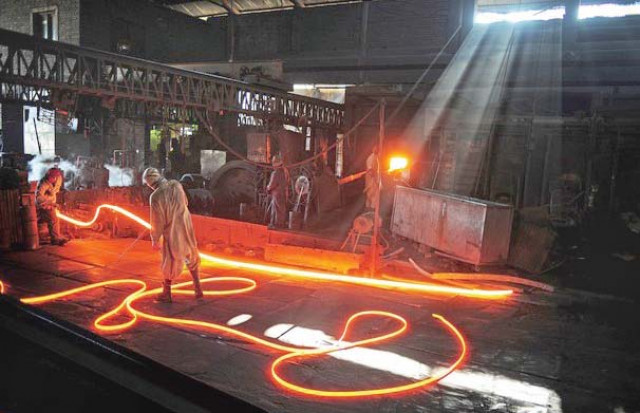Pakistan Steel privatisation looks even more difficult than last attempt
Former minister suggests govt should privatise the mill even if it attracts a lower price.

From 2000 to 2008, PSM rode on best years of its history as it continuously posted profits. PHOTO: FILE
When the Supreme Court of Pakistan objected to its privatisation in 2006, Pakistan Steel Mills (PSM) had over Rs9 billion lying in bank accounts. It had closed previous fiscal year with a profit of Rs6.7 billion. It was churning out 979,000 tons of steel products and had raw material sufficient for several months.
Today, the plant is literally shut. With long-term debt of over Rs40 billion, it is caught up in a vortex where it borrows money every year to pay off past debt. Whatever little is left goes towards meeting cost of running coke oven batteries, furnaces and paying salaries, leaving nothing for coal and iron ore.
It still has 18,000 people on its payroll, many of whom have been hired to please politicians. The financial burden of settling debt and injecting equity without cutting cost is something that Pakistan Muslim League-Nawaz’s government doesn’t seem interested in doing, especially under the IMF’s watchful eye.
Among the loss-making state-run enterprises, the government is pushing for privatisation of Pakistan International Airlines (PIA). But the fact that no substantial effort has been made to fix matters at PSM reflects some intentions of the policymakers.

“It is as important for this government to privatise Pakistan Steel Mills as it was for us,” says Awais Ahmed Khan Leghari, who was heading the privatisation ministry when the PSM deal was struck down. “Government should sell it even if investors offer a price below than what we received.”
PSM has had a poor financial history. Since it started full-fledged production in the mid-1980s, it remained in losses for most of the years. News reports in 1991 were as bleak about the country’s largest industrial concern as they appear today.
From 1969 when work started on the mills under the guidance of then chairman Syed Saeed Jafferi until 2013 when CEO Major General (Retd) Muhammad Javaid is running the show, it has seen 26 managements taking up the reins. Except for three, none of them could exploit the dominant position of the PSM in the market.
All these years until 2000, PSM’s production cost would always be more than revenue despite the fact Pakistan imports most of its steel requirement.
No wonder that it was as far back as May 29, 1997 that the Council of Common Interests gave the go-ahead for privatisation. However, the plan was shelved by the time General (Retd) Pervez Musharraf came to power.

From 2000 to 2008, PSM rode on best years of its history as it continuously posted profits. But before that, the government had to clear up some of the mess.
“By 2000, PSM was carrying Rs19 billion in debt. Of this, around Rs12 billion was the principal amount, which the government settled to kick-start transformation,” recalls Lieutenant General (Retd) Abdul Qayyum, who was PSM chairman in 2004-06. “Payment of rest of the debt was deferred until 2013.”
Towards this end, the contribution of Lieutenant Colonel (Retd) Afzal Khan, who spearheaded the transformation from 1999 to 2003, must be appreciated. It was during his tenure that PSM was put in order.
One of the most important contributors to the restructuring was the presence of uniformed officers at the helm of affairs that kept unions under control.
“We had unions but there was no CBA because of a court order. More importantly, there was no outside interference in organisational affairs like we later saw from 2008 onwards,” says Qayyum. “By the time I quit in 2006, all the debt was settled and we had plenty of cash and spare parts.”
Then what went wrong? How can a company which had always enjoyed a monopoly plunge in crisis? How can its steel be sold below cost when the market has a good appetite for the product? How can imported steel, which is shipped hundreds of kilometres on oil-run ships, compete with local supply?
“Mismanagement, corruption, overstaffing and extremely poor marketing...this is what happened to PSM,” says Qayyum. “When the management is not capable, then it can’t exploit the organisational potential.”
Industry officials are almost unanimous that it was sheer misjudgement and corruption which landed PSM in accumulated losses of over Rs90 billion in the past five years.
One oft-repeated story is the impact of global meltdown in 2008. The story goes like this: as commodity prices crashed, PSM was sitting on massive unsold inventory and expensive raw material. When it should have used strong-arm tactics to sell the steel to traders it did nothing. Consequently, it had to sell the products at a loss from which it never recovered. In between all of this, steel products were sold to favourites at a loss while costly raw material was purchased against kickbacks.
In following months, corruption cases were filed, the apex court took up the matter, FIA grilled officers, newspapers reported wrong deals and NAB got involved. But nothing came out of it.
Now as fixing PSM becomes imperative, privatisation has turned out to be a difficult task.
Awais Leghari says in 2006 the government was selling the mills as a going concern. “We weren’t just selling an asset. We were selling a business. People failed to understand that.”
With current losses and debt, the government would have to make some hard choices, he said. “PSM has excess land that could be sold to generate cash.”
Despite repeated attempts, State Minister for Privatisation Khurram Dastgir Khan didn’t respond.
Published in The Express Tribune, November 11th, 2013.
Like Business on Facebook, follow @TribuneBiz on Twitter to stay informed and join in the conversation.



















COMMENTS
Comments are moderated and generally will be posted if they are on-topic and not abusive.
For more information, please see our Comments FAQ